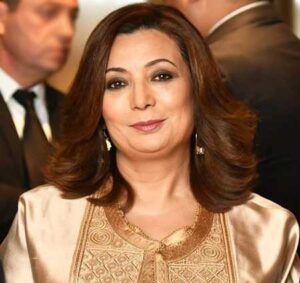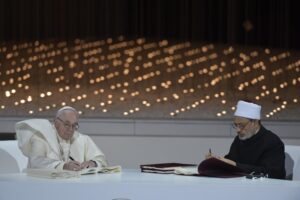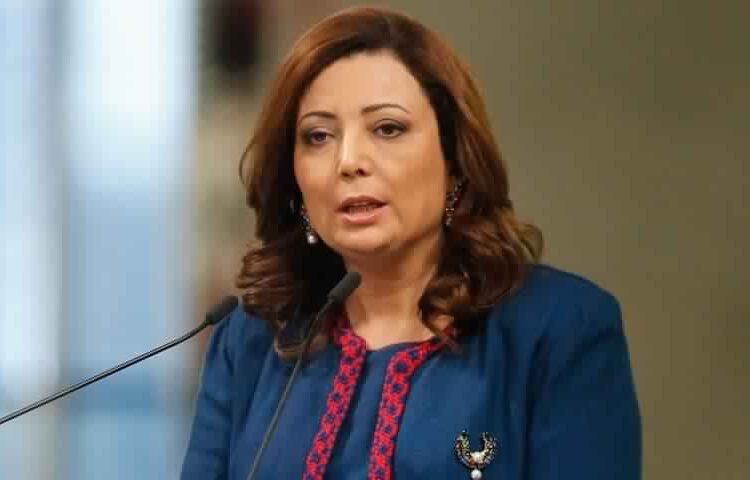While looking back on 2022 and moving forward into 2023, high hopes are pinned on decision makers, organisations and initiatives to put an end to the rising tone of conflicts and the subsequent economic ramifications. As we start 2023, The Egyptian Mail, in its first edition in the New Year, sat with Dr. Ouided Bouchamaoui, 2015 Nobel Peace laureate and 2023 Judging Committee member of the Zayed Award for Human Fraternity, to know more about her reflections and her current activities.
In general, the Zayed Award for Human Fraternity was launched in 2019 when the historic meeting took place in Abu Dhabi between His Holiness Pope Francis and His Eminence the Grand Imam of Al-Azhar Professor Ahmed Al-Tayeb. They co-signed the Document on Human Fraternity. The award is an annual independent international award that recognises the tireless efforts exerted by people and entities of all backgrounds worldwide. The main goal of this award is to give unique boost to peaceful coexistence.

“The award recognises all those who worked, still work and will work for solidarity, integrity, fairness, and optimism. I think nowadays we do need to recognise that some people are really doing good for humanity,” she said.
According to Nobel Laureate, it is of paramount importance to enhance integrated efforts and enhance human connection besides participating in constructive dialogue and co-operation. Meanwhile, it is also crucial to empower to protect human dignity.
As for the committee, Bouchamaoui said it includes people from different backgrounds whose main goal is to select among all the candidates, who have tangible mark in their work for the humanity and for the interconnection between civilisations, for the peace, and for helping others. The winners may be members of government or current or former heads of state or Members of Parliament and many more.
“We have to be neutral. What we are looking for is what the candidates are doing on the ground. They have the knowledge and expertise to speak to others, to understand others, to listen to others, and to not to forget his own or her own ego and to think about what to do for others. We are always looking for people that are doing something new and big, something that has great impact on the local ground, and maybe, why not on international ground?”
Regarding the regional dimension, the judging committee member said that the candidates’ work is top priority.
“The important thing is how they can respect all the criteria that we have put. The winners could be from one region. Maybe we can only have one, or two, it depends on their work.”
As for the selection process, the permanent secretary receives candidates from all different criteria and then they send them to the judging committee to select from them.
“We have to select from each list and we have to select the number of candidates, and we have to justify why we selected these candidates. The work is not so easy and a difficult task for us because we received so many impressive candidates.”
She went on to say that the committee is neutral when it agrees together to choose the best and the closest candidate to win the award c.
On personal level, Bouchamaoui said that as a Nobel peace laureate, she is always looking for peace and dialogue as it’s the peaceful way to reduce and avoid conflicts and to find solutions.
“We need to sit around the table to put the problems or the conflict points on the table to discuss them one by one. When we are listening to each other, maybe we can share our ideas that may help us understand each other better.”
It is worth mentioning that the award is organised annually by the Higher Committee of Human Fraternity, and includes a $1 million prize. Each year, there is an independent judging panel of prominent figures from around the world, who have great experience in the area of peaceful co-existence and peacebuilding.
Recipients of the Zayed Award for Human Fraternity included His Majesty King Abdullah II ibn Al Hussein and Her Majesty Queen Rania Al Abdullah of the Hashemite Kingdom of Jordan, António Guterres, United Nations Secretary-General, His Eminence Professor Ahmed Al-Tayeb, Grand Imam of Al-Azhar and His Holiness Pope Francis, Head of the Roman Catholic Church.

“When they asked me to be a member of the 2023 judging committee, I was delighted and honoured. The Zayed Award for Human Fraternity is something which is really related to one person. I mean that Sheikh Zayed bin Sultan Bin Nahyan, who founded the United Arab Emirates, did much for his country and for peace. I was also impressed with the meeting of Grand Imam of Al-Azhar Ahmed El Tayeb and Pope Francis in Abu Dhabi. I think when you have people like those leading this kind of tolerance, it’s a really big honour.”
The third thing that impressed Bouchamaoui is that the judging committee members include Nobel Peace Laureates, people from the from the United Nations, people that have a longer career in addition to different organisations .
“So, to be among all these people, who have this big background, this big capacity to discuss together, I think it’s very important for me, and it allows me also to know others.”
Bouchamaoui was impressed with how many people have real passion and work on ground to support people that are suffering and were not well treated, and particularly for women, for the minorities, and for children.
“I’m always looking to participate in such big efforts to say thanks to people and organisations that protect human dignity. They are looking for a better environment and better life for people and that’s very important to me.”
At international level, Bouchamaoui said people trust that dialogue as the best way to reduce conflicts and that is why the award has been receiving positive reactions worldwide.
“It’s a well-known prize and it is highly competitive. We can say that this award is a guide of commitment.”
Regarding the participation of young people, Bouchamaoui said it is too early to say that they did a lot of the tolerance and they have to learn about the experiences of the adults.
“And I think we need time. Maybe they are going to be involved in this. Why not? Maybe if they followed such role models. We know that many of them they are doing well. They are really working on such kinds of issue.”
Reflecting on the ongoing geopolitical changes worldwide, the Nobel Peace Laureate opined that when you have people from different backgrounds, from different religions, from different thinking and from different areas and they work together in different places, this is the best way to say yes.
“I mean ‘yes’ to humanity and how I can aspire to do something for the human fraternity, how I can change this world without helping others to live together, friendly and without any conflicts.”
Bouchamoui also stressed the vital role played by media.
“We need your presence here. We need your involvement. And because with you and we can access information. We can also show some role models. I think, media in general and social media particularly, have a big role to play just to say, if you’re doing a good job, there are others who are listening to you. They are seeing you, so please, continue doing that and people are going to recognise what you’re doing.”
By highlighting and recognising those who are doing tangible work, others can adapt their work to their countries.
“And for sure, I’m going to succeed as you succeeded.”
Bouchamaoui said sustainability is another unique thing about the award.
“It’s going to be forever. Those who organise this award, they already worked in the past but they have a vision for the future.”
“We need to sit around the table to put the problems or the conflict points on the table to discuss them one by one. When we are listening to each other, maybe we can share our ideas that may help us understand each other better.”
It is worth mentioning that the award is organised annually by the Higher Committee of Human Fraternity, and includes a $1 million prize. Each year, there is an independent judging panel of prominent figures from around the world, who have great experience in the area of peaceful co-existence and peacebuilding.
Recipients of the Zayed Award for Human Fraternity included His Majesty King Abdullah II ibn Al Hussein and Her Majesty Queen Rania Al Abdullah of the Hashemite Kingdom of Jordan, António Guterres, United Nations Secretary-General, His Eminence Professor Ahmed Al-Tayeb, Grand Imam of Al-Azhar and His Holiness Pope Francis, Head of the Roman Catholic Church.
“When they asked me to be a member of the 2023 judging committee, I was delighted and honoured. The Zayed Award for Human Fraternity is something which is really related to one person. I mean that Sheikh Zayed bin Sultan Bin Nahyan, who founded the United Arab Emirates, did much for his country and for peace. I was also impressed with the meeting of Grand Imam of Al-Azhar Ahmed El Tayeb and Pope Francis in Abu Dhabi. I think when you have people like those leading this kind of tolerance, it’s a really big honour.”
The third thing that impressed Bouchamaoui is that the judging committee members include Nobel Peace Laureates, people from the from the United Nations, people that have a longer career in addition to different organisations .
“So, to be among all these people, who have this big background, this big capacity to discuss together, I think it’s very important for me, and it allows me also to know others.”
Bouchamaoui was impressed with how many people have real passion and work on ground to support people that are suffering and were not well treated, and particularly for women, for the minorities, and for children.
“I’m always looking to participate in such big efforts to say thanks to people and organisations that protect human dignity. They are looking for a better environment and better life for people and that’s very important to me.”
At international level, Bouchamaoui said people trust that dialogue as the best way to reduce conflicts and that is why the award has been receiving positive reactions worldwide.
“It’s a well-known prize and it is highly competitive. We can say that this award is a guide of commitment.”
Regarding the participation of young people, Bouchamaoui said it is too early to say that they did a lot of the tolerance and they have to learn about the experiences of the adults.
“And I think we need time. Maybe they are going to be involved in this. Why not? Maybe if they followed such role models. We know that many of them they are doing well. They are really working on such kinds of issue.”
Reflecting on the ongoing geopolitical changes worldwide, the Nobel Peace Laureate opined that when you have people from different backgrounds, from different religions, from different thinking and from different areas and they work together in different places, this is the best way to say yes.
“I mean ‘yes’ to humanity and how I can aspire to do something for the human fraternity, how I can change this world without helping others to live together, friendly and without any conflicts.”
Bouchamoui also stressed the vital role played by media.
“We need your presence here. We need your involvement. And because with you and we can access information. We can also show some role models. I think, media in general and social media particularly, have a big role to play just to say, if you’re doing a good job, there are others who are listening to you. They are seeing you, so please, continue doing that and people are going to recognise what you’re doing.”
By highlighting and recognising those who are doing tangible work, others can adapt their work to their countries.
“And for sure, I’m going to succeed as you succeeded.”
Bouchamaoui said sustainability is another unique thing about the award.
“It’s going to be forever. Those who organise this award, they already worked in the past but they have a vision for the future.”






Discussion about this post